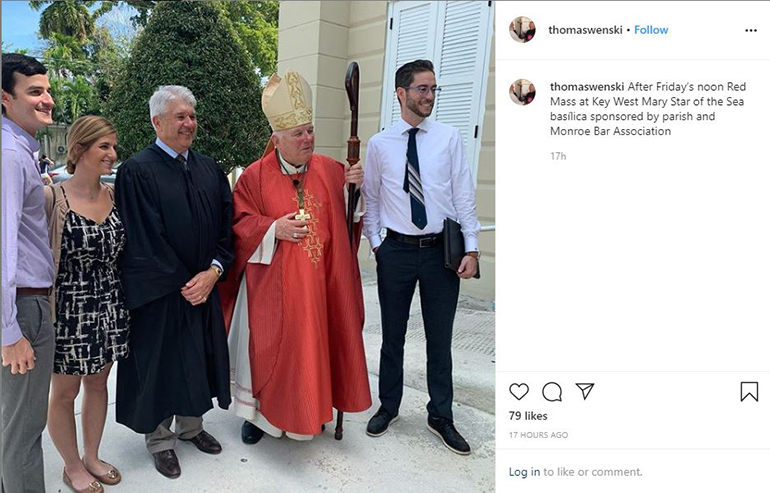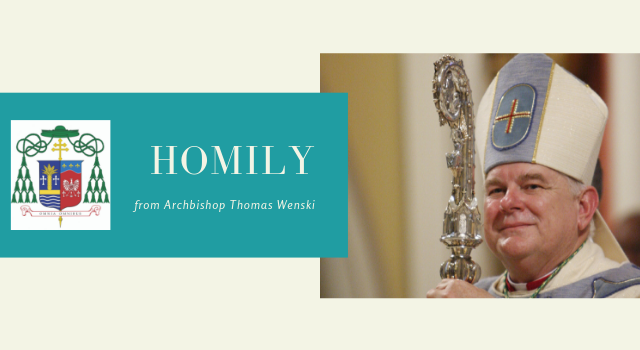By Archbishop Thomas Wenski - The Archdiocese of Miami

Photographer: Via Instagram @thomaswenski
Archbishop Thomas Wenski poses for photographs after celebrating the annual Red Mass for legal professionals in Monroe County, March 6, 2020, at the Basilica of St. Mary, Star of the Sea, in Key West.
Archbishop Thomas Wenski preached this homily March 6, 2020 , at the celebration of the annual Red Mass for legal professionals in Monroe County. The Mass was celebrated at the Basilica of St. Mary, Star of the Sea, in Key West.
We gather at this annual Red Mass to invoke the Holy Spirit promised by Jesus to his followers. We pray today for a renewed outpouring of his gifts upon the members of the bar.
“You have heard it said... But I say to you.” Matthew is telling us here how Jesus interprets and explains the law of God. Today’s Gospel takes the example of the the fifth commandment: You shall not kill! Jesus reveals what God wanted when He gave this commandment to Moses.
The law says: You shall not kill! (Ex 20:13). In order to observe fully this commandment it is not sufficient to avoid murdering. It is necessary to uproot from within everything which, in one way or another, can lead to murder, for example, anger, hatred, the desire to revenge, insult, and exploitation, etc.
Matthew 5:23-24. The perfect worship which God wants. In order to be accepted by God and to remain united to Him, it is necessary to reconcile oneself with brother and sister.
Perhaps in these times of increased polarization and bitter divisiveness, we need the gifts of the Holy Spirit and the fruits of the Spirit more than ever to bring us to true wisdom – and healing. During the Lenten season, the Scriptures call us to renewed conversion of mind and heart. Be reconciled to God is the challenge of Lent – and as today’s Gospel reminds us, we cannot be reconciled with God without reconciling with our brothers and sisters. Come, Holy Spirit!
Last evening, I confirmed a number of young people here in this church. In the confirmation ritual, the Holy Spirit is referred to as the Paraclete, a word borrowed from the Greek, Paracletos. In the Gospel according to St. John, which was originally written in Greek, Jesus refers four times to the Holy Spirit as Paracletos.
I try to take care to pronounce “paraclete” carefully; but I am sure that the kids –and their parents – hear parakeet. This Greek word – paracletos, not parakeet – can be translated as Counselor, Advocate, Helper and Comforter. Literally it means “one called alongside of” to aid, exhort and encourage.
We should not be surprised, therefore, to learn that this Greek word was used in legal settings to refer to an attorney making a defense in court on behalf of someone accused. Thus, the Holy Spirit as “paraclete” is given to us, Christians, to stand beside us in support as we battle temptation and endure the trials of this world, and to rebut the accusations of the “Accuser,” that is the devil. (Apologies to any prosecutors here today.)
Nor should we be surprised that lawyers – both defenders and prosecutors – and judges should feel the need to invoke the help and encouragement of the Holy Spirit as they carry out their duties as officers of the court: for you are Counselors, Advocates, Helpers and Comforters as citizens navigate their way through our legal system.
Our legal system recognizes the rights of the individual to seek redress for grievances while at the same time affirming the presumption of innocence. These principles undergird our American system of justice and due process. As Americans we are ruled by law – not by despots or by mobs. By praying for you today, we honor your noble vocation – and your dedication and devotion to the rule of law.
But, as I said, we are living in a difficult time. Some have described our time as being not so much an era of change but the change of an era. One of the signs of the time is that society’s institutions are being called into question. Certainly, these institutions have been undermined to one extent or another because of corruption and greed, because of the abuse of authority and power. Positions of service are turned into instruments of personal gain. We see this in politics, we see this in academia, in the press, in the entertainment world, in business – and certainly we have seen this in the Church. And your own profession has not been immune.
For these reasons and others that have yet to be well articulated, people are increasingly addicted to “outrage.” In fact, the internet and cable news support a whole industry devoted to “outrage” — which could be defined as talk designed to provoke emotional responses — anger, fear, moral indignation among others. This “outrage industry” is sustained by overgeneralization, sensationalism, inaccurate information and “ad hominem” attacks.
Oppositional research designed to uncover dirt about an opponent is seen as a legitimate tactic in the “contact sport” that is today’s politics. Bloggers use “outrage” as click bait and those talking heads on cable TV exploit it as a strategy to increase audiences and therefore their advertising revenue.
Debate and argument are replaced with shrill polemics, polemics that generate little light but much heat that feeds the outrage.
But if we allow ourselves to be blinded by outrage, justice will no longer prevail. If we discard due process, then a benighted tribalism will inevitably overtake us.
Without reference to a common truth "derived from the Laws of Nature and Nature's God" people feel set adrift — and this is the reason for their outrage which is, in many ways, a projection of fear. When a democracy bases itself on moral relativism and when it considers every ethical principle or value to be negotiable (including every human being's fundamental right to life), it is already, and despite its formal rules, on its way to totalitarianism. The might of right quickly becomes might makes right.
And so, we pray that you, members of the bar, following the example of Sir Thomas More, whom we invoke as Saint Thomas More, may be true “paracletes.” Filled with the wisdom and courage of the Holy Spirit, may you “stand alongside of” your fellow citizens as Counselors, Advocates, Helpers and Comforters.

